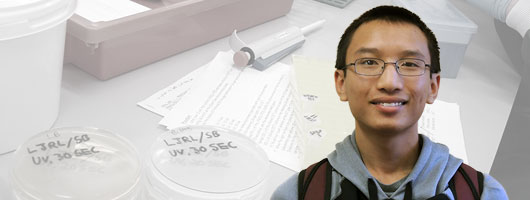 Pictured :: Tony Nguyen :: Biological Sciences :: Granger, Indiana (hometown)
Pictured :: Tony Nguyen :: Biological Sciences :: Granger, Indiana (hometown) Bachelor of Arts in Biological Sciences
Degree Map >>
About the Bachelor of Arts in Biological Sciences
Bachelor of Arts (B.A.) students receive a rigorous grounding in biology that provides a launching pad for careers in private industry, with non-profit or government organizations, teaching at the secondary level, or some health professions (e.g., optometry, physician assistant, or physical therapy). Students have the opportunity to couple their biology education with a minor degree (e.g., business, environmental studies, sustainability studies, or psychology) that supports their career aspirations. To help foster student success, faculty provide high-quality academic and career advising throughout the student’s time at IU South Bend.
The curriculum includes up-to-date content in a wide variety of elective courses as well as education in the process of scientific discovery, with emphasis on reading scientific literature, writing about and presenting scientific information, designing scientific studies, and collecting, manipulating, and analyzing scientific data. Many students also work closely with faculty on independent research projects that teach valuable laboratory and field skills and increase success in applications for post-graduate employment or admission to professional programs. Compared to the B.S. degree, the B.A. places less emphasis on the cognate disciplines of chemistry, physics, and mathematics, and because of this, students seeking to enter M.S. or Ph.D. programs or medical, pharmacy, dental, or veterinary school are advised to take the B.S. in place of the B.A.
Academic Advising
Students planning to major in biology should contact an academic advisor in Biological Sciences before their first semester to develop a plan for their academic course of study. College policy on advising requires that students meet with their academic advisors at least once each year; biology majors meet with their advisors prior to each semester’s enrollment. Advising holds are reset following advising appointments. To determine the name and contact information for your advisor, see One.IU.
Degree Requirements (120 cr.)
Students receiving the Bachelor of Arts degree must complete 120 total credit hours including:
- The IU South Bend campuswide general-education curriculum (33-39 cr.)
Note :: MATH courses for the B.A. in Biology fulfill the quantitative reasoning requirements
Note :: BIOL-L 403 Biology Seminar fulfills the Visual Literacy requirement and is required for all biology majors - The College of Liberal Arts and Sciences Bachelor of Arts additional requirements (14-23 cr.)
- Major concentration and elective requirements (see below)
- The Required Minor (15-18 cr.) taken in any campus school or interdisciplinary program
- A minimum of 30 credit hours at the 300- or 400-level
Biology courses and all courses required for the minor must be completed with a grade of C– or higher.
All courses are 3 credit hours, unless otherwise designated.
Major Requirements (40-42 cr.)
Biological Science
- BIOL-L 101 Introduction to Biological Sciences 1 (5 cr.)
- BIOL-L 102 Introduction to Biological Sciences 2 (5 cr.)
- BIOL-L 211 Molecular Biology
- BIOL-L 311 Genetics
- BIOL-L 403 Biology Seminar
Chemistry
- CHEM-C 105 Principles of Chemistry I
- CHEM-C 106 Principles of Chemistry II
- CHEM-C 125 Experimental Chemistry I (2 cr.)
- CHEM-C 126 Experimental Chemistry II (2 cr.)
- CHEM-C 341 Organic Chemistry Lectures 1
Physics
- Select one of the following:
- PHYS-P 201 General Physics 1 (5 cr.)
- PHYS-P 221 Physics 1 (5 cr.)
Mathematics
- Select one of the following:
- MATH-M 119 Brief Survey of Calculus 1
- MATH-M 215 Calculus I (5 cr.)
Elective Courses in Biology (18 cr.)
- Students must complete at least 18 additional credit hours of elective biological sciences courses. This coursework must include at least two laboratory classes, at least one course from the organismal courses area, and at least one course from the cellular courses area.
Organismal Courses
- BIOL-B 300 Vascular Plants
- BIOL-L 304 Marine Biology
- BIOL-L 308 Organismal Physiology (5 cr.)
- BIOL-L 318 Evolution
- BIOL-L 342 Tropical Marine Biology Field Course
- BIOL-L 473 Ecology
- BIOL-L 474 Field and Laboratory Ecology (2 cr.)
- BIOL-L 490 Individual Study (1-12 cr.)
- BIOL-Z 373 Entomology
- BIOL-Z 383 Laboratory in Entomology (2 cr.)
- BIOL-Z 460 Animal Behavior
- PHSL-P 262 Human Anatomy and Physiology 2 (5 cr.)
Cellular Courses
- BIOL-L 280 Introduction to Bioinformatics
- BIOL-L 312 Cell Biology
- BIOL-L 313 Cell Biology Laboratory
- BIOL-L 317 Developmental Biology
- BIOL-L 321 Principles of Immunology
- BIOL-L 323 Molecular Biology Laboratory
- BIOL-L 490 Individual Study (1-12 cr.)
- BIOL-M 430 Virology Lecture
- MICR-M 310 Microbiology
- MICR-M 315 Microbiology Laboratory (2 cr.)
Photo credit :: Carrie Kellenberger via Flickr :: cc